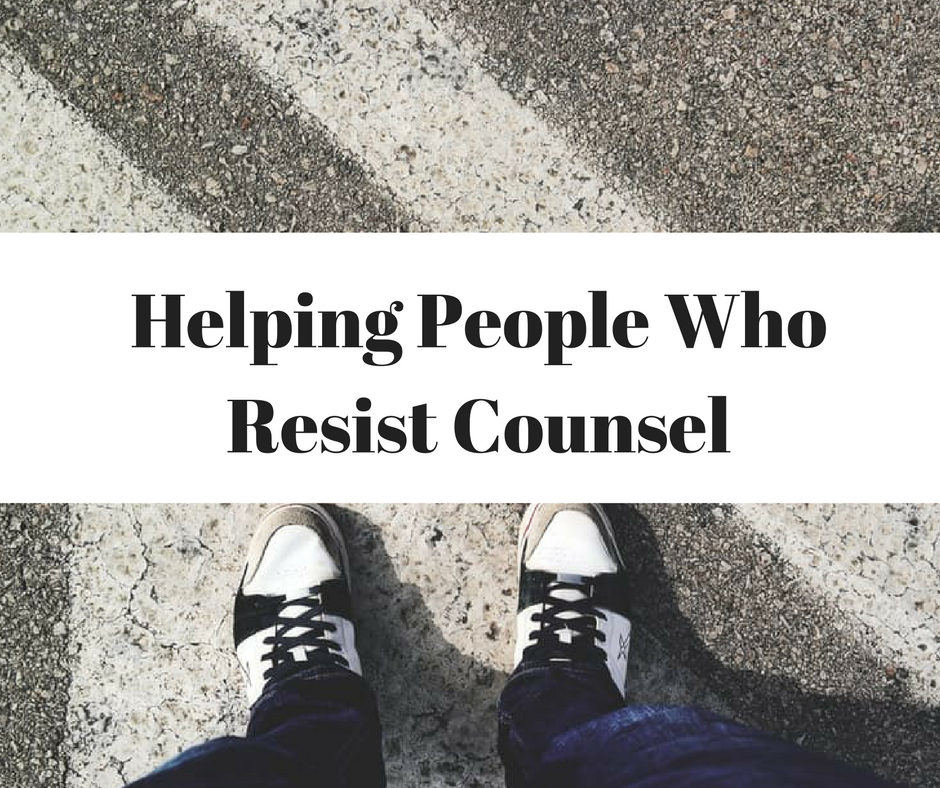Why do some people resist biblical counsel, even though they need it? Biblical counselor and a former BCC staffer Jeff Forrey tackles this problem. Here’s part one of a two-part series. Jeff’s article appeared first here on the Biblical Counseling Coalition website and is used with permission.

If you’ve been in ministry for a while, I’m sure you’ve encountered hurting people who resist biblical counsel. They are quick to say something like, “Yeah, I know that, but …”
Assuming relevant Scripture is offered, why wouldn’t a Christian be eager to receive God’s Word?
Here are a few reasons a Christian may resist.
The Counselor May Misunderstand
If you fail to get a thorough understanding of people’s struggles and life circumstances, then there could be a number of unwanted consequences—any of which might “sour” a person from receiving what you have to offer. For example:
Your advice might not even address the central concern of the person. That certainly will cut down your credibility with the person who has received “off the wall” advice.
If you are uninformed, then you can come across as insincere (or rushed or even annoyed), because you have spoken too soon without double-checking that your conclusions were warranted. Notice, this is not saying that you really are insincere, rushed, annoyed, and so on, only that you have given this impression.
Either way, the effect can be the same.
The Counselor May Seem Insincere
Notice that in both of these scenarios, the hurting person has trouble getting beyond the person who is offering Scripture. Although God’s Word is powerful and effective, that doesn’t remove the responsibility we have to present biblical counsel in a sensitive and winsome manner.
Recall Proverbs 27:14,
If anyone loudly blesses their neighbor early in the morning, it will be taken as a curse.
Even words of blessing can be “blunted” by the sharpness of a person’s insensitivity.
I think this is a powerful reminder that God’s Word is not a “magic bullet.” The Bible is a tool used by the Holy Spirit to prompt change when it is offered by people who have already been changed by it.
This is why Paul goes to great lengths to remind Timothy about what kind of person he should strive to be (1 Tim. 4:12, 6:1; 2:20–25) and what kind of people he should seek out as leaders in churches (1 Tim. 3:1–10).
The Counselor May Fail to Grasp Expectations
Without first getting to know a hurting person, you might fail to grasp that the person has a different expectation for this conversation than you do: you might want to offer a solution, but the hurting person is not looking for a solution (at least at this time).
For example, some people think out loud; they are best able to process needs in their life by using others as a sounding board. It’s not uncommon for these people to perceive a quick solution as intrusive rather than insightful. After all, they are still trying to understand themselves.
All three of these potential scenarios reminds us that before any word of advice—or encouragement—is given, sufficient time must be devoted to understanding the hurting person’s struggles in the context of his or her life. Furthermore, they also underscore how important it is to listen attentively and deliberately, because careful listening is the only way to understand another person’s particular needs.
Develop Good Listening Skills
The book of Proverbs mentions the value of attentive listening numerous times, and strikingly, the writers link poor listening habits to folly! For example:
Fools find no pleasure in understanding but delight in airing their own opinions (Prov. 18:2).
In Proverbs, “fools” are self-absorbed, shortsighted, impulsive, and dangerous. It makes perfect sense, then, that they would be poor listeners. Because they don’t care about others, they are more interested in getting themselves heard. Even if you don’t intend to be foolish, you can inadvertently come across as foolish if you speak too quickly.
To answer before listening—that is folly and shame (Prov. 18:13).
You cannot be wise in relationships without developing good listening skills.
The heart of the discerning acquires knowledge, for the ears of the wise seek it out (Prov. 18:15, emphasis added).
If you take the time to focus on understanding hurting people, you will simultaneously be inviting them to consider what you might have to share from Scripture. Although it is not from the Bible, this proverb rings true: “People don’t care how much you know until they know how much you care.”







